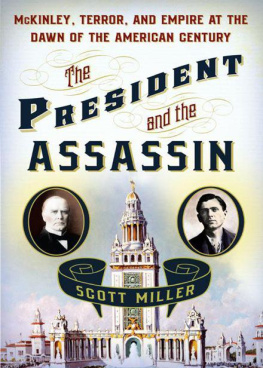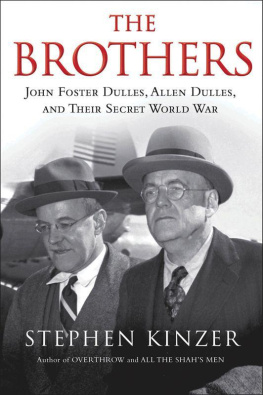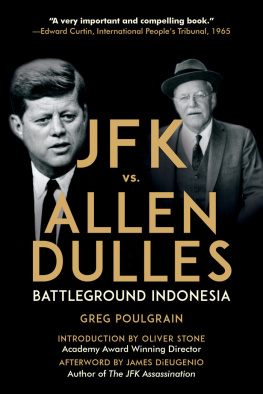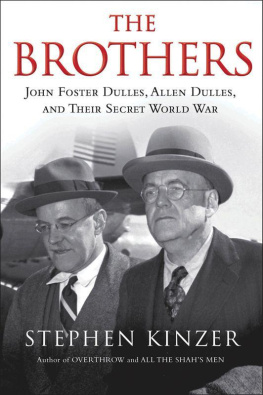We hope you enjoyed reading this Simon & Schuster eBook.
Join our mailing list and get updates on new releases, deals, bonus content and other great books from Simon & Schuster.
C LICK H ERE T O S IGN U P
or visit us online to sign up at
eBookNews.SimonandSchuster.com
Thank you for downloading this Simon & Schuster eBook.
Join our mailing list and get updates on new releases, deals, bonus content and other great books from Simon & Schuster.
C LICK H ERE T O S IGN U P
or visit us online to sign up at
eBookNews.SimonandSchuster.com
ALSO BY SCOTT MILLER
The President and the Assassin: McKinley, Terror, and Empire at the Dawn of the American Century

Simon & Schuster
1230 Avenue of the Americas
New York, NY 10020
www.SimonandSchuster.com
Copyright 2017 by Scott Miller
All rights reserved, including the right to reproduce this book or portions thereof in any form whatsoever. For information, address Simon & Schuster Subsidiary Rights Department, 1230 Avenue of the Americas, New York, NY 10020.
First Simon & Schuster hardcover edition March 2017
SIMON & SCHUSTER and colophon are registered trademarks of Simon & Schuster, Inc.
For information about special discounts for bulk purchases, please contact Simon & Schuster Special Sales at 1-866-506-1949 or .
The Simon & Schuster Speakers Bureau can bring authors to your live event. For more information or to book an event, contact the Simon & Schuster Speakers Bureau at 1-866-248-3049 or visit our website at www.simonspeakers.com.
Interior design by Ruth Lee-Mui
Jacket Design by Alison Forner
Jacket Type Treatment by Grace Han
Image Robin Macmillan/Trevillion Images
Library of Congress Cataloging-in-Publication Data
Names: Miller, Scott, 1960 author.
Title: Agent 110 : Allen Dulles, American spymaster, and the German underground in World War II / Scott Miller.
Other titles: Agent One Ten
Description: First Simon & Schuster hardcover edition. | New York : Simon & Schuster, 2017. | Simon & Schuster nonfiction original hardcoverTitle page verso. | Includes bibliographical references and index.
Identifiers: LCCN 2016025790| ISBN 9781451693386 (hardcover : alkaline paper) | ISBN 9781451693393 (paperback : alkaline paper) | ISBN 9781451693409 (ebook)
Subjects: LCSH: Dulles, Allen, 18931969. | World War, 19391945Secret serviceUnited States. | World War, 19391945Secret serviceSwitzerland. | Espionage, AmericanGermanyHistory20th century. | Anti-Nazi movementGermany. | SpiesUnited StatesBiography. | Intelligence officersUnited StatesBiography. | United States. Office of Strategic ServicesBiography. | GermanyPolitics and government19331945.
Classification: LCC D810.S8 D835 2017 | DDC 940.54/5673092dc23
LC record available at https://lccn.loc.gov/2016025790
ISBN 978-1-4516-9338-6
ISBN 978-1-4516-9340-9 (ebook)
The OSS insignia is a registered trademark of The OSS Society, Inc., and is used with its permission.
To Karen
Contents
Preface
In the wee hours of July 21, 1944, Colonel Claus von Stauffenberg, a decorated veteran of the German armys North African campaigns with the looks of a matine idol, was led out of army headquarters in Berlin. He and three other condemned officers were told to wait in a narrow courtyard illuminated by truck headlights as a firing squad was hastily assembled. His sleeve soaked with blood from a gunfight only minutes earlier, Stauffenberg watched as the first three men were shot and their bodies carried away. Positioning himself to face the riflemen, Stauffenberg shouted a final act of defiance, Long live our sacred Germany!
The executions were the start of what would become a massive bloodletting throughout Germany, Adolf Hitlers retribution for an attempt on his life in East Prussia only twelve hours earlier. That attack at the Wolfs Lair, Hitlers heavily fortified command post, had initially seemed to succeed, as a powerful bomb had detonated only feet from the Fhrer as he reviewed maps and battle plans with trusted advisers. Several had been killed. Believing that Hitler was among them, Stauffenberg and scores of others had launched a bold coup attempt that afternoon that had virtually shut down Berlin. Yet Hitler, incredibly, had emerged badly shaken but very much alive.
I first learned of the details of that night when working in Frankfurt as a correspondent for The Wall Street Journal . On a visit to Berlin, a friend pointed out to me the scene of the executions at the old army headquarters. The event seized my imagination, starting with the bravery of the men who had launched the plot. The odds of succeeding were slim, and the masterminds behind what is celebrated as Operation Valkyrie knew the grisly consequences of failure. Just as mesmerizing for me was how close they came to pulling it off. Were it not for small twists of fate, the conspirators would have changed the course of history.
Years later, I came across the seemingly unrelated figure of Allen Dulles. He is most famous for his service as the head of the US Central Intelligence Agency during the height of the Cold War. The failed Bay of Pigs invasion in Cuba and numerous US-sponsored coup attempts, from Iran to Indonesia, are part of his legacy from that era. Less known is Dulless role during World War II in Switzerland, where he set up a station for the CIAs predecessor, the Office of Strategic Services (OSS).
Assigned the code number 110, Dulles made the station arguably the most valuable of Americas intelligence-gathering outposts. He and his men organized commando raids, cultivated spies in the heart of Hitlers government, and rescued informants from the Gestapo. Dulles reveled in such operations and retold his exploits for years in books such as Great True Spy Stories . In the words of a British intelligence officer, Kenneth Strong, Dulles was the last great Romantic of Intelligence, a man whose stock-in-trade consisted of secrets and mysteries.
Running a spy ring, Dulles was party to numerous intriguing adventures, yet from my perspective, this didnt necessarily provide a cohesive story line. For some time I wrestled with finding a common thread that would tie his work together and add a larger element to the narrative. With the help of my editor, Alice Mayhew, I unearthed the story that became this bookthat of the German resistance leaders and the American spy who worked with them.
Men and women in Germany had been trying to depose Hitler for years before Dulles arrived in Bern, Switzerland, in late 1942. They were a diverse bunch, some working alone, others in groups, each driven by his or her own reasons. Such was their determination and cunning that on several occasions Hitler had barely escaped plots against him. Dulles, a former diplomat and lawyer with numerous German business contacts, offered a fresh resource.
As my research progressed, I discovered layers to the basic narrative. The story of Dulles and the resistance foreshadowed the Cold War. Almost as important as unseating Hitler was the concern over the nature of the regime that would replace him. Would Germany align itself with the West, or would it fall into the orbit of the Soviet Union? This was a question that greatly troubled Dulles, and it informed much of his work. He once described the conspirators as realistic enough to appreciate that the Germany which would survive Hitler would not be a military or a political power, but under the control of the victors. But which of the victors?
Next page















